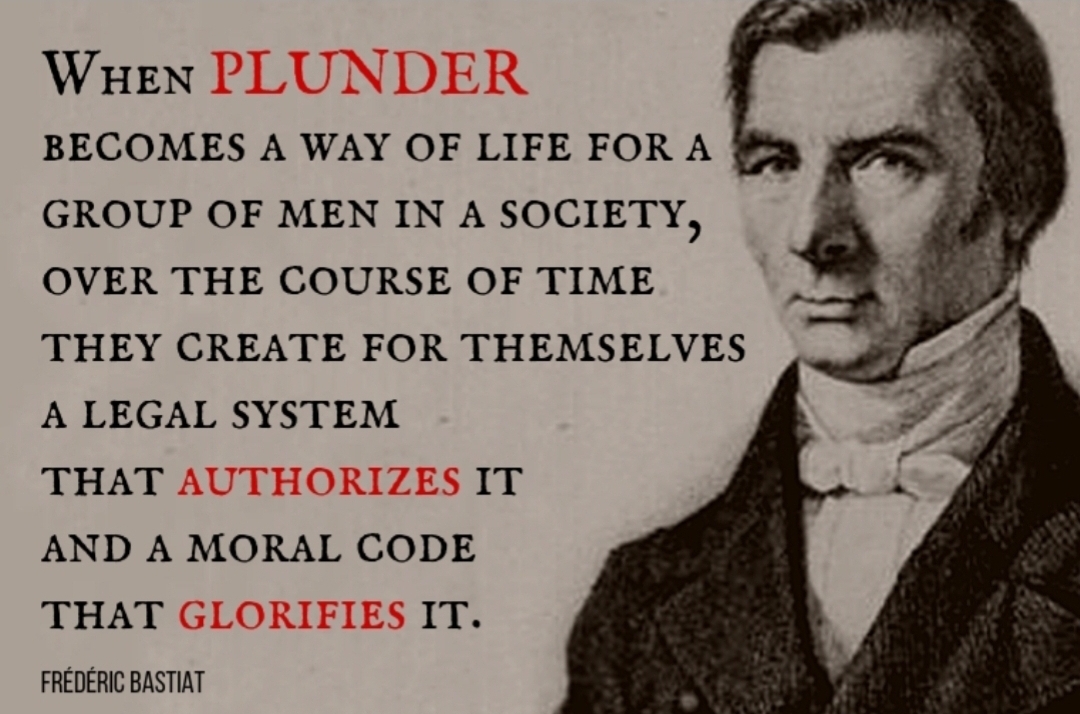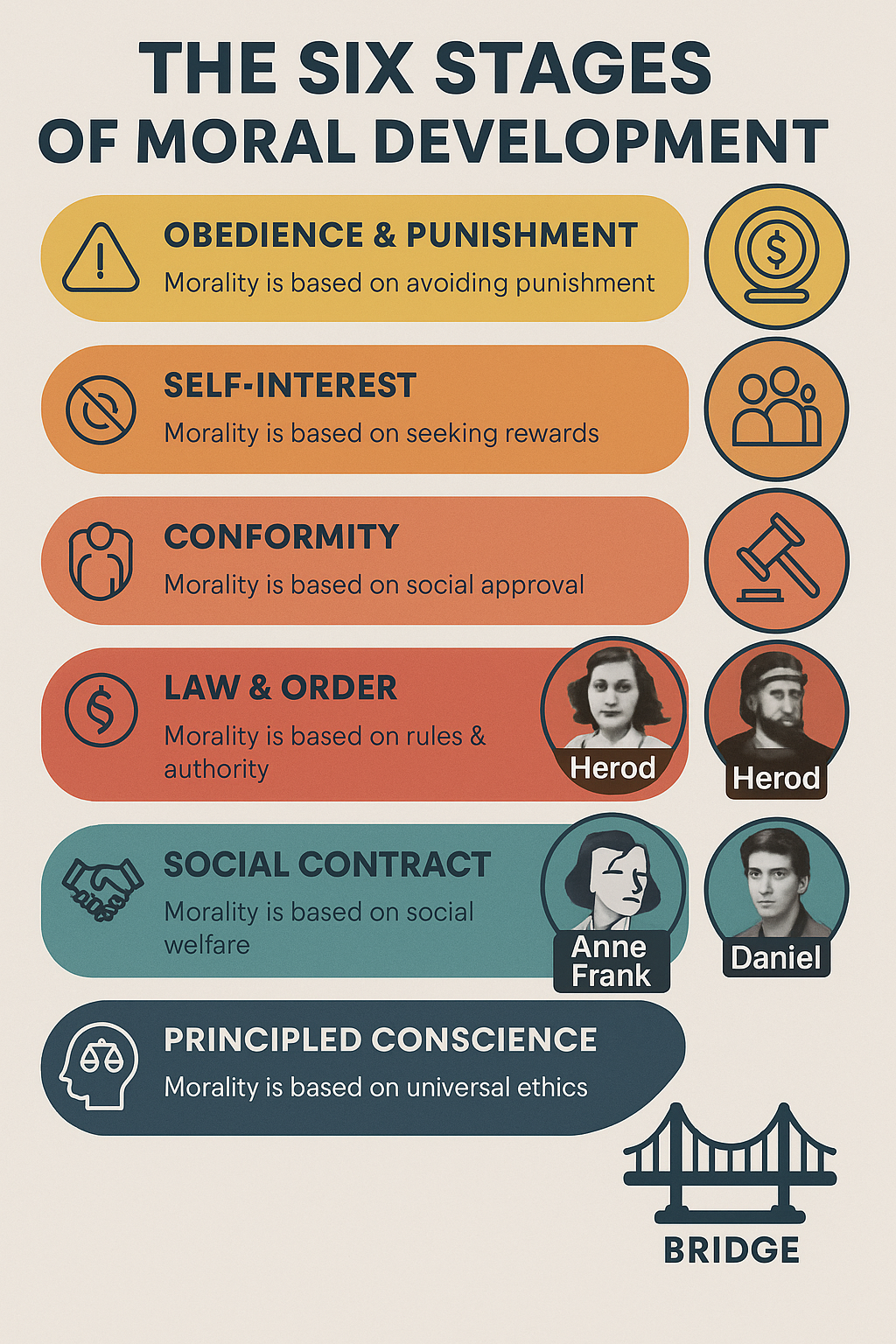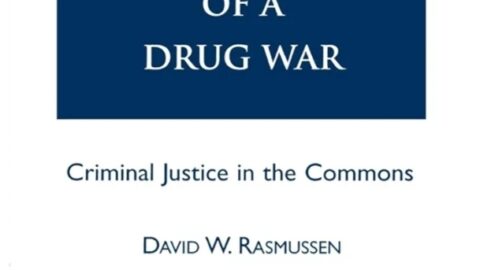“The people who hid Anne Frank were breaking the law.
The people who killed her were following it.”
– Anonymous Reflection
This powerful observation captures an essential truth: the legality of an action does not determine its morality. Throughout history, societies have passed laws that sanctioned oppression, violence, and injustice, while true morality often demanded resistance to those very laws. To understand this dynamic more deeply, we turn to Lawrence Kohlberg’s Theory of Moral Development, which outlines six stages of moral reasoning.
Understanding this helps us grasp the difference between those who simply follow rules and those who live by higher, universal moral principles.
The Six Stages of Moral Development (Kohlberg)
Level 1: Pre-Conventional Morality
- Stage 1: Obedience and Punishment Orientation
(Avoid punishment.) - Stage 2: Self-Interest Orientation
(What’s in it for me?)
Level 2: Conventional Morality
- Stage 3: Interpersonal Accord and Conformity
(Good boy/girl attitude; seek approval.) - Stage 4: Authority and Social-Order Maintaining Orientation
(Law and order; obey rules and laws unquestioningly.)
Level 3: Post-Conventional Morality
- Stage 5: Social Contract Orientation
(Laws are social contracts but can be changed for greater good.) - Stage 6: Universal Ethical Principles
(Principled conscience; justice, dignity, and equality transcend man-made laws.)
Anne Frank: Law vs. Morality
- The Nazis who enforced laws persecuting Jews, including Anne Frank, were operating at Stage 4: Authority and Social Order. They viewed the law itself as the ultimate moral standard.
- The people who hid Anne Frank—risking their lives—were operating at Stage 6: Universal Ethical Principles. They disobeyed unjust laws to uphold higher moral truths: protecting human life, dignity, and freedom.
Lesson:
Blind obedience to law is not the same as moral righteousness. Sometimes, true morality demands civil disobedience when man-made laws become evil.
King Herod and the Killing of the Innocents
In the Bible, King Herod ordered the mass slaughter of male infants in Bethlehem (Matthew 2:16) to eliminate the threat he believed Jesus posed to his throne.
- Those who carried out Herod’s orders were at Stage 4—following law and authority without questioning morality.
- The wise men (Magi) refused to report back to Herod after visiting Christ, defying his command and risking punishment. They operated closer to Stage 6, valuing the sanctity of life and divine instruction over human authority.
Lesson:
Throughout history, the most tyrannical actions have often been legally sanctioned. True moral courage lies in resisting evil, even when it masquerades as lawful authority.
Other Biblical and Historical Examples
1. Daniel in the Lion’s Den (Daniel 6)
- Daniel refused to obey King Darius’s decree forbidding prayer to God.
- Daniel prioritized God’s law over man’s law (Stage 6 behavior).
2. Shadrach, Meshach, and Abednego (Daniel 3)
- Refused to bow down to King Nebuchadnezzar’s golden image.
- Risked their lives rather than violate divine commandments.
3. Rosa Parks (1955)
- By refusing to give up her bus seat, Parks violated unjust segregation laws (Stage 6) to promote higher principles of equality and justice.
4. The Early Christians
- Under Roman persecution, early Christians defied imperial law to continue preaching and practicing their faith. Many were martyred for choosing God’s command over Caesar’s.
Why Most People Stay at Stage 4
According to Kohlberg, most adults never move beyond Stage 4.
- Society trains people to value order, rules, and conformity.
- Questioning laws or authorities is often socially punished.
- Fear of rejection, loss of security, or punishment keeps people “in the box” of obedience rather than progressing to independent moral reasoning.

This is why totalitarian regimes can flourish: most people will follow evil orders if they believe they are merely “doing their job” or “following the law.”
The Role of God and True Morality
True morality, according to Scripture, is grounded not in the shifting sands of human law, but in God’s eternal, unchanging principles.
- “You cannot serve God and mammon” (Matthew 6:24) reminds us that worldly systems often conflict with divine morality.
- “We ought to obey God rather than men.” (Acts 5:29) sets the clear priority.
Moral laws derived from God’s character (justice, love, mercy, truth) are the true standards.
When human laws diverge from divine law, it is our duty to stand for the higher good, even at great personal cost.
Bridging the Gap: Moving from Stage 4 to Stage 6
How do we encourage ourselves and society to move beyond blind obedience to authentic moral reasoning?
- Educate in True Morality:
Teach children and adults universal ethical principles, not just obedience. - Study Scripture Deeply:
Understand God’s laws, His character, and His expectations of justice and mercy. - Promote Classical Liberal Education:
Teach history, philosophy, theology, logic, and rhetoric to foster critical thinking. - Cultivate Courage:
It often requires bravery to defy unjust systems. Moral courage must be honored. - Build Communities of Integrity:
Surround yourself with people committed to truth, even when it’s costly.
Conclusion
History shows repeatedly that those who blindly follow unjust laws can become agents of evil, while those who have the moral clarity and courage to resist become heroes in the eyes of eternity.
The story of Anne Frank, the heroes of Scripture, and countless brave souls across history remind us:
True morality transcends human laws. It demands allegiance to God’s higher law — even against the tide of society.






